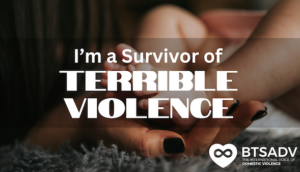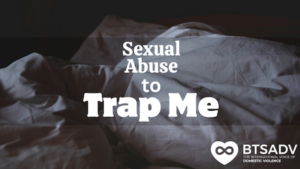For those who have been battered yet find the courage to pack up and leave their abusers, the road from victim to survivor is not an easy one. It can be filled with fear, doubt and sometimes danger. Although one battle may end when you first walk out—if you take your abuser to court, it becomes a struggle of another kind.
Survivors who have fled intimate partner violence, including those who went to court, will tell you that fighting to reclaim their lives was worth it. One such survivor who only wished to be identified by her first name, Audria, has been out of her DV relationship for 16 years.
“After I left, I was homeless. I would take that—and the not knowing what was on the other side—over staying there.”
Like Audria, many survivors leave behind everything they own and must face economic uncertainty. According to the National Center Against Domestic Violence (NCADV), victims of intimate partner violence in the U.S. lose a cumulative total of 8.0 million days of paid work each year. The economic cost of intimate partner violence exceeds $8.3 billion per year. Between 21-60% of victims of intimate partner violence lose their jobs due to reasons stemming from the abuse.
“Initially, my ex was charged with a felony because he put me in the hospital. He broke two of my ribs,” Audria said. “Because of those charges, he originally had to have court ordered, supervised visitation with our children.”
When Audria made her decision to leave, she went to the hospital for help. There they took pictures of her injuries, and filed a police report. According to HG.org, documenting the truth of the abuse will make it easier to get a restraining order. Also, the court requires the individual to furnish “reasonable proof” of abuse. Evidence can be in the form of medical records, police reports of recent abuse incidents, and photographs of injuries.
“I left [for good] with my children, a laundry basket of clothes and my car and drove eight hours to my sister, who lives in Fort Worth, and then went to a Shelter. I was homeless and penniless. I had to start all over again… The shelter offered an umbrella of services, and the first thing the shelter did was help me establish an emergency protective order. It was hard. A lot of women don’t want to go to a shelter, but I realized no one is going to abuse me there.”
Most of the domestic assaults reported to law enforcement take place after the couple separates, therefore, going to a shelter for safety is vital. Shelters offer a variety of assistance options. For Audria, the shelter she chose, Safe Haven, gave her a secure place to hide. They helped her get an Emergency Protective Order. They offered counseling services for individuals, groups, and families. They set up an appointment for a job. They offered her clothing for the job interview and for her personal needs. They assisted her in getting Medicaid, food stamps, adding her and her children to a housing list, and finding her a legal team—who then devised a strategy for taking her husband to court.
“Sometimes we forget when looking for a lawyer that we have the ability to ask questions,” advises Audria, “Make sure the attorney has experience dealing with domestic violence cases. Make sure that they are trained and know the domestic violence laws.”
Domestic violence restraining orders require the offender to stay away from the individual’s home, workplace, school, or daycare provider of the children. Depending on the circumstances, a judge may also include safety orders, such as prohibiting the respondent from having guns, or having a police officer by your side for a maximum of 15 minutes while essential personal items are being removed from the home by either of the parties.
For custody and parenting time orders, a lawyer needs to file a family law case (Findlaw.com). A judge will ask a few questions to discern the seriousness of the circumstances. Based on the responses received, the judge will rule about the parenting time order. Next, a hearing is scheduled, so the plaintiff/victim can present evidence of the abuse or call witnesses to testify.
“I couldn’t have survived without my legal team… When your life is falling apart, you need organization. It’s like a bomb went off and everything just scattered. They were very organized, and sometimes, literally held my hand to get me through. I was too afraid to walk, much less speak.”
According to research, 78% of domestic violence cases get dismissed because the victim recants the statement. It is not uncommon for victims of domestic violence, after leaving the abusive relationship, to feel isolated and alone, and the idea of taking legal action can seem overwhelming. In the United States, the Legal Services Corporation will provide an attorney that specializes in Family Law to domestic violence victims for free. It is important for DV victims to have access to these resources and support from qualified help.
The time it takes to resolve a domestic violence dispute will vary from case to case. For Audria, the litigation lasted 4 ½ years. The legal battle was over the home they had bought together from her parents –the home she had grown up in. Initially, her lawyers also demanded $40,000 owed by her ex for back child and spousal support and waged a custody battle for their two children. As a strategy, her husband’s lawyer frequently delayed the proceedings.
Both Audria and her ex had served in the military. The defending attorney made the argument that her ex-husband was a disabled veteran. Because of this, the charges against him were eventually lowered to a misdemeanor, and he had to attend a six-month batterer intervention program.
After 4 ½ years, Audria decided to settle the case.
In the end, she gave up keeping her childhood home. She also waived the $40,000 in backpay of spousal and child support, with the stipulation that he would pay child support going forward.
“It’s not that I didn’t think that he should pay the support. I did. I was just done and wanted to move on,” Audria said. “Also, sometimes, children are in the crossfires of a custody battle. I didn’t want to put mine through that.”
Despite the adversity and trauma, Audria’s courage and faith restored her voice. She now serves on the leadership boards for the organizations which helped her out, including Safe Haven—the shelter where her journey began.
‘My childhood, into adulthood, into a relationship. I lost my voice. I never had a voice. I was always silenced,” says Audria
Recently, she stood before the House and Senate in Texas, told her survivor story and advocated for a bill to amend a state Family Code regulation which hadn’t been updated in 20 years. The bill was passed on Thursday, May 25th 2023, and it will provide financial resources for organizations like Safe Haven that continue to offer the umbrella of services to those in situations like Audria’s. This bill will also supply funds for other agencies that offer counseling and housing programs.
“God led me back to [Safe Haven]. In telling them I was ready to help, it started with sharing my story. He literally helped me break my silence…and the way I was able to do that was going back to the shelter and telling them I was ready to help… [T]hey asked me are you willing to share your story, and I said, “Okay.””
Domestic Violence Victim Resources:
US National Domestic Violence Hotline: 1-800-799-7233
BTSADV Hotline number: 1-855-287-1777
Women’s Law Directory of Shelters & advocates https://www.womenslaw.org/find-help/advocates-and-shelters
Domestic Violence Resources State-by-State https://www.findlaw.com/family/domestic-violence/domestic-violence-information-by-state.html )
Protective Order forms State-by-State https://www.findlaw.com/family/domestic-violence/domestic-violence-state-forms.html









